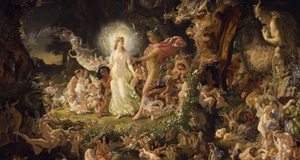A Midsummer Night's Dream: Imagination, Romantic Love, and the Creation of Art
By
2010, Vol. 2 No. 01 | pg. 1/1 In A Midsummer Night’s Dream, Shakespeare plays with the themes of love, art, imagination, and dreaming to forge an overall meaning for his work. His play within a play, found in Act V, expands on his themes and portrays the relationship between the audience and the performers on stage. Specifically, Quince’s disordered prologue to the play mirrors the distorted reality characterizing the dreamy, nighttime woods; overall, the interjected play underscores Shakespeare’s larger aim of exhibiting the necessity of imagination and dreaming to the maintenance of loving relationships and to the creation of art. As Quince introduces the play, the audience realizes his failure to correctly punctuate his statements. By utilizing incorrect grammar, Quince’s words take on a whole new meaning. He innocently transforms a courteous introduction into a rather offensive preface. As expected, Theseus proves highly critical of Quince’s disorganized dialogue, proclaiming “This fellow doth not stand upon points” (5.1.118). Later, he adds, “His speech was like a tangled chain – nothing/ impaired, but all disordered” (5.1.124-125). Theseus reveals that by using incorrect grammar, Quince unknowingly speaks what he does not mean; essentially, he speaks an untruth. Theseus seems bothered by such untruth, relating it to a “tangled chain,” or a web of lies. In this instance, Theseus’ character emerges as one decidedly reliant on truth and fact. He rejects anything fanciful, preferring physical, proven knowledge. In other words, he stands in opposition to the poet, the artist who transcends the material world in order to make sense of the supernatural world. Shakespeare emphasizes such aspects of Theseus’ character to contrast Theseus and his world of facts to the world of the poet, the world of creativity, dreams, and fanciful notions. Of course, In A Midsummer Night’s Dream, Athens represents the physically grounded world of facts, while the woods represent the metaphysical world of the poet’s imagination.In the first scene of Act V, Theseus further reveals that he does not believe in the fantasy world of the woods. He fails to trust in the seemingly fanciful tales of the lovers and rejects all notions of magic in the woods. He contends, “I never may believe / These antique fables, nor these fairy toys” (5.1.2-3). Just as he rejects Quince’s “lies” in the prologue, Theseus rejects what he supposes to be the lies of the lovers. Therefore, the disordered nature of Quince’s speech mirrors the distorted, dream-like world of the woods. Theseus considers both falsities, since they misrepresent or fail to adhere to the “rules” of his factual world. In the first instance, Quince employs the English language, which Theseus comprehends, but his sentence structure yields an entirely different meaning. Quince’s true meaning, while capable of being deduced, is initially concealed. In the second instance, Theseus finds himself completely unable to comprehend the woods, the realm of imagination and dreams. In effect, by rejecting both Quince’s prologue and the woods, Theseus rejects the imagination and creative energies of the artist, both of which abound in the woods. He fails to recognize that using words in novel, unexpected, and humorous ways can develop into a form of art in its own right. Thus, although Quince distorts his intended meaning, his words still represent his own original, creative art form. Theseus discards this notion, along with the realm of the artist, the woods. Moreover, in failing to place any stock in imagination or dreams, Theseus unwittingly removes any hope for romantic love. Indeed, his love life emerges as entirely devoid of any of the truly romantic or dreamy qualities of love. Throughout the play, Shakespeare portrays how the experience of love often seems like a dreamlike experience and cannot be proven, as Theseus would like, with facts and rational arguments. For instance, the relationship between Hermia and Lysander seems quite romantic at the beginning of the play, as the young lovers escape to the woods to elope in secret. Likewise, at the end of the play, even the newly formed relationship between Helena and Demetrius closely parallels the ideals of romantic love. The scene in Act V clearly echoes Shakespeare’s idea of love, presented in multiple parts of the play. Perhaps the greatest example of the dream-like qualities of love emerges in the awakening of Titania to Bottom, with whom she immediately falls in love. For Titania, real life becomes a dream. Upon first observing Bottom, even in his transformed shape, she exclaims, “Mine ear is much enamoured of thy note; / So is mine eye enthrallèd to thy shape; And thy fair virtue’s force perforce doth move me / On the first view to say, to swear, I love thee” (3.1.122-125). Titania’s language emerges as flowing and poetic; she ends in a sing-song rhyming couplet, supplicating her lover. Shakespeare emphasizes the poetic qualities of the language of love; he additionally exaggerates the dream-like nature of love in Titania’s awakening and immediate falling in love. Even Bottom initially doubts her instantaneous love, but eventually admits that “reason and love keep little company together nowadays” (3.1.127-128). Bottom upholds that reason and love cannot exist together. Theseus’ world of reason and facts cannot coexist with the dreamlike and poetic world of love in the woods. Consequently, the relationship between Theseus and Hippolyta stands in sharp contrast to any of the other lovers in the play. Theseus admits at the very beginning of the play that he “wooed thee [Hippolyta] with the sword” (1.1.16). His marriage exhibits inequality as he assumes a domineering role. Furthermore, Theseus woos Hippolyta with the sword and not with the poetic language of love, unlike the other lovers in the play. Theseus attempts to keep his world of reason separate from the world of romantic love. Interestingly, in Act V, Hippolyta voices a desire for, or at least an attraction to, the romantic love which Hermia and Helena experience. In response to Theseus’ comment concerning his disbelief in the lovers’ stories, Hippolyta argues, “But all the story of the night told over, / And all their minds transfigured so together, / More witnesseth than fancy’s image, / And grows to something of great constancy” (5.1.23-26). Hippolyta seems to want to believe the lover’s tales; she wants to trust in their romantic notions. In an attempt to persuade Theseus, she uses the rational argument that because all the lovers experience the same transforming power, their experiences do not represent mere figments of the imagination. Instead, she argues, they prove factual in nature. Hippolyta uses reason to relay a desire for love, but she only uses reason in order to better supplicate her husband, a man of reason. In this way, Hippolyta seems very much attracted to the world of dreams and romantic love, which Shakespeare designates as the woods. While Theseus denies such a world, he ironically gives an accurate description of the poet at the beginning of Act V: “The poet’s eye, in a fine frenzy rolling, Doth glance from heaven to earth, from earth to heaven, / And as imagination bodies forth / The forms of things unknown, the poet’s pen / Turns them to shapes, and gives to airy nothing / A local habitation” (5.1.12-17). In effect, Theseus describes the particular ability of the poet to transcend material boundaries, give substance to the abstract, and provide words for the otherwise unexplainable. Although he later condemns the imaginative notions of the poet as “tricks,” Theseus nevertheless seems to grasp the role of the poet. While Quince unknowingly speaks untruth, Theseus unknowingly speaks a truth which he quickly attempts to dismiss. Even earlier in Act V, Theseus draws a connection between three seemingly unrelated persons: the lunatic, the lover, and the poet. He holds that the three “are of imagination all compact” (5.1.8). Once again, Theseus reveals that he manifests some deeper knowledge, since the three persons are indeed related in their ability to dream. Lunatics think dreams represent reality; lovers dream about the people they love; and poets dream of a world beyond the physical world and make it accessible to people through language. While Theseus speaks the truth, he still does not seem to latch onto to the value of dreaming and imagination yet. By contrast, Shakespeare revels in such a world of fancy. In fact, at the very end of his play, Shakespeare warns the audience through the character of Robin to accept the play as a mere dream. The scene indeed reflects the themes surrounding the play within the play. Robin poetically explains, “If we shadows have offended, / Think but this, and all is mended: / That you have but slumbered here, / While these visions did appear” (5.2.1-5). In this instance, Shakespeare shows the audience how he has taken them on a journey into his dream world in the form of his play. Acting in the role of the poet, Shakespeare transcends physical boundaries and taps into his imagination to create an illusory world in his play. Just like his art transcends reality, his play takes his audience away from reality for awhile. As a poet, Shakespeare emphasizes the necessity of dreaming for the creation of art. He suggests that imagining alternate realities, such as the woods, can yield a work of art. Indeed, Shakespeare creates his play from his own imaginings, reflections, and dreams. While Theseus describes his rejection of imagination directly following Quince’s prologue, he actually revises his thoughts on imaginations in the middle of the small play. Theseus tells Hippolyta, “If we imagine no worse than they of them-/selves, they may pass for excellent men. Here comes two noble beasts in: a man and a lion” (5.1.211-213). Essentially, Theseus becomes immersed in the imaginative world of the play; he succumbs to its entertainment and leaves his world of reason for awhile, trusting in the actors. The scene marks the transformation of Theseus’ character; before, he never willingly accepts the “tricks” which imagination plays (5.1.18). Now, however, Theseus recognizes the need for imagination to believe in the ridiculous actions of the play, if only temporarily. Shakespeare, of course, emerges victorious in convincing a non-believer to reassess the world of dreams and to eventually believe in the strength of the imagination. In A Midsummer Night’s Dream, Shakespeare uses Quince’s prologue to revisit the concepts of imagination and dreaming, specifically as they apply to romantic love and the creation of art. Ultimately, Theseus and the audience alike recognize the transforming characteristics of imagination. Moreover, the audience better understands the interaction between performers and audience during a play, acknowledging the manner in which performers introduce the audience to an alternative world. Theseus’ words concerning the poet ring true, especially at the end, when Shakespeare begs the audience to think of the play as a dreamlike experience. Overall, the audience admits, the play itself seems to be a vision or concoction of one of Shakespeare’s own nighttime dreams.
Greenblatt, Stephen, et al., eds. Essential Plays [&] the Sonnets. New York, NY: W.W. Norton & Company, Inc., 1997. Suggested Reading from Inquiries Journal
Inquiries Journal provides undergraduate and graduate students around the world a platform for the wide dissemination of academic work over a range of core disciplines. Representing the work of students from hundreds of institutions around the globe, Inquiries Journal's large database of academic articles is completely free. Learn more | Blog | Submit Latest in Literature |














